Haiti: Election Circus for Diaspora, More Kaka from MINUSTAH
Haiti has no government. Of the 1,500 elected officials who populated the country’s political life in 2011, the only one left is Michel Martelly, if one overlooks the fact that he was brought to power in rigged elections. Five years have have come and gone since Haiti’s last elections. Two cycles of legislative and municipal elections have passed and been neglected; consequently the parliament was dissolved on January 12, 2015. Plenty of damage has been done to Haiti’s agricultural economy, but the international community is at an impasse with regard to the country’s minerals. They cannot carry off Haiti’s gold without either some semblance of legitimacy or the exercise of brute force. There were too many protests in fall 2014 and early 2015. Even the carnival, a soccer tournament, and a juicy sex scandal, the usually guaranteed distractions, have failed. It is time for elections.
The electoral calendar is as follows:
- August 9, 2015 – First round of the legislative elections.
- October 25, 2015 – Second-round of legislative elections; local elections; first round of presidential elections.
- December 27, 2015 – Second round of presidential elections.
Compared to the $5-million 2010 fiasco, this time around, it will cost about 10 times more money to rent Haiti. Of the $50-60 million anticipated expenditure for the 2015 (s)elections, $37.9 million were confirmed by June 1, 2015, with the following breakdown:
Haiti & US = US, $20.3 million (53%)
EU, 6.8 million (18%)
Canada, 5.3 million (14%)
Japan, 4.5 million (12%)
Brazil, 1.0 million ( 3%)
The United Nations Development Programme (UNDP) will manage all the funds. As before, the Organization of American States (OAS) and others will be paid handsomely to monitor the elections. If they found them to be free and fair back in 2011, when the most popular political party, Fanmi Lavalas, was banned from the elections, they will surely find them to be flawless now that they are being paid even more money. In the August 9, 2015 legislative elections, 30,000 observers from 70 national and international organizations, under armed guard from 9,000 MINUSTAH agents and Haitian police, were supposed to monitor the election personnel of 4,000 supervisors and 41,175 members. Eyewitnesses said these observers could hardly be seen anywhere that day, except in Haiti’s wealthiest neighborhoods. Nice work if you can get it.
There were initially more than 100 political parties, with 2,029 candidates for the legislature and 70 candidates for the presidency. This included some whose Haitian citizenship was dubious. Furthermore, over 30 candidates for the Lower House and four candidates for the Senate were alleged criminals who appeared to be seeking the cover of Haiti’s immunity laws, which protect candidates and elected legislators from prosecution by the State.
Legislative
From the start, it was clear that the legislative and local elections would be stolen or, shall we say, bought. In a systematic campaign of gerrymandering, the beach towns in the country’s north and south, and other touristy areas such as Ganthier, which contains the famous Saut d’Eau, were redistricted without any justification. In all, 19 new Members of Parliament (MP) were added to Haiti’s Lower House, for a total of 119 seats, instead of the previous 100. Two months later, Martelly announced that five new cities would also be formed by presidential decree, to bring the total number of cities to 145; one of these would be in the area of Les Arcadins, where he owns beachfront property.
On May 15, 2015, about 1,400 of the 2,029 candidates for the legislature were accepted: 1,249 candidates for 119 MP seats, and 178 candidates for 20 senate seats. The Interim Electoral Council (CEP) in charge of the elections was accused of a lack of transparency, because it gave no explanation for the retention of 69 percent of the candidates for legislature and dismissal of the rest, except in cases where the candidacies had been formally challenged. Throughout Haiti, the rejected candidates organized protests. Route 2 to Petit Goave was blocked by stone throwing and barricades of burning tires, as was National Highway 3 of Mirebalais. In Petion Ville, the rejected candidates organized a sit-in. Curiously, despite these difficulties for other candidates, it took more than one challenge to annul the candidacy of Michel Martelly’s wife, Sophia Saint-Remy Martelly, for senator, although she had been born in New York and had traveled for many years on a US passport.
According to AlterPresse, in the run up to the August 9 legislative elections, about 10 people were beaten, 26 injured by gunshots, and five killed. Among the dead were three campaign workers from the Verite party, who were shot by assassins on motorcycles, and one CEP worker. By midday on August 9, one election worker, Victoria Jean-Baptiste, had been shot in the mouth, in the Commune of Desdunes, Artibonite Department. As during the 2010 elections, the candidates themselves and government people were responsible for much of the violence. An Interim Agent (Martelly appointee to replace a local governor or mayor), Carter Fourrien, was alleged to have used a weapon to injure an election worker in Belladere. Another Interim Agent, Samuel Fidel, from Ouanaminthe, was alleged to have entered a polling station with a firearm and with prepared ballots for stuffing into the ballot boxes. A candidate for MP, Frantz Moise, and five of his partisans were arrested for allegedly torching a polling station in Marigot. Another candidate for MP, Ernst Jeudy, was ejected from the elections on September 16 after the discovery that “he had been found guilty and convicted for possession and traffic of cocaine by Miami Dade County, in the US, in 1987,” according to a CEP press release.
A report from Haitian rights organizations, which deployed 1,500 of their own observers throughout the country, concluded that, in addition to the elections being entirely disorganized, there was intimidation, violence, and electoral fraud in at least 50 percent of the country’s polling stations. Voters were not organized into lines to vote and had no privacy while voting. Many polling stations opened late. Ballots were delivered to wrong addresses, etc. In at least the town of Montagne La Voute, many people could not vote because their names had been scrubbed from the voter rolls. Frantz Duval, the Editor in Chief of the Nouvelliste reported that the police had acknowledged that by noon, 26 polling centers had to be shut down in the country, mostly because of vandalism. The turnout was abysmal. In some districts, hardly any voters showed up. By noon, all over Haiti, the election workers abandoned their posts as the polling stations got vandalized. In the town of Savannette, three polling stations were torched by a group of heavily armed men. All polling stations in Saint Marc, Grand Saline, and Desdunes were attacked. In the sizable city of Jeremie (pop. 31,000), in the Grand Anse Department, the vote was cancelled. One Jeremie candidate for MP, Midrime Wesh, was attacked the partisans of another candidate. There were at least two election-related killings on August 9: one in Plaine du Nord and the other in Dondon.
Despite all this, and an estimated voter turnout of only 3 to 5 percent, the observers from the OAS and European Union concluded that, overall, the elections of August 9 were acceptable. On August 16, Haitian rights groups made public their discovery that some of the so-called election observers accredited by the CEP were not observers at all but political-party representatives who were buying votes. For more than a week, the internationally financed CEP was counting ballots around the clock and under guard from MINUSTAH and the DynCorp-trained Haitian National Police (PNH). On August 18 and 19, the CEP ejected 16 MP candidates from the elections because of their alleged participation in intimidation, including former MP Arnel Belizaire, one of Martelly’s major political opponents. The results of the elections were rejected in advance by at least eight major parties and political organizations: Fanmi Lavalas, Fusion, Renmen Ayiti, Ayisyen pou Ayiti, Alah, Mouvman Revolisyonè Ayisyen, Defile Pati Politik, and Canaan.
The CEP divulged election results on August 20, 2015 (http://www.cephaiti) that turned out to be preliminary. Even by its rosiest estimates, the voter turnout was “lower than 18 percent at the national level,” and between 5 and 8 percent in the greater Port-au-Prince area, which is home to 40 percent of the electorate. Out of 119 MP candidates, only 9 were elected in the first round! The Organisation du Peuple en Lutte (OPL) political party said that these results were unofficial because they had not been signed by the Council members. Moreover, OPL officials Francisco de la Cruz, Harry Masant, and Yrvelt Chery asserted that the CEP’s results differed from those of the tabulation center. All over the country, and especially the cities where no one could vote, there were protests, in many cases violent, and calls from candidates and voters to annul the elections. Finally the CEP officially announced on the night of September 27, 2015 that 8 out of 119 MP candidates were elected in the first round of the August legislative elections. Four of these were from Michel Martelly’s Parti Haitien Tet Kale (PHTK, Haitian Bald-Head Party), and the rest were from an assortment of other parties. Similarly, only 2 out of 20 senators were elected, both of them affiliated to Martelly: Jean-Renel Senatus, who had been Martelly’s attorney general, and Youri Latortue, who had been prime minister through the political purges and mineral-rights sales that immediately followed the removal of President Jean-Bertrand Aristide in 2004.
Despite the August 9 disaster, the order to the CEP from the international community has been to proceed with the elections. The CEP has merely modified its electoral calendar as follows:
- October 25, 2015 – Second-round legislative elections; first round of missed/controversial legislative elections; municipal elections; first-round presidential elections.
- December 27, 2015 – Second round of controversial legislative elections; local elections; second-round presidential elections.
Presidential
Regardless of which Haitian puppet is the lucky choice in the presidential elections, the Haitian State — i.e. Michel Martelly functioning with an unconfirmed prime minister and without a parliament or judiciary — has already signed a document with the UNDP that hands the country’s treasury to the international occupiers. So the UN is not leaving Haiti but, rather, preparing itself for its first exercise in managing a country.
Along with the elimination of candidates for the legislature, on June 3, 2015, the CEP rejected three candidates for the presidency: Anthony Bennett, Antoine Joseph, and Laurent Salvador Lamothe. Curiously, Bennet had not been on the list of 70 candidates. The publicity around the elimination of former PM Lamothe, who was probably a naturalized US citizen, drowned out all news of the protests about the candidates who had been eliminated from the legislative elections. Mirlande Manigat, who had been in the final round against Martelly in 2010-11, bowed out this time and warned that the elections would be rigged. On June 12, the CEP eliminated 12 more candidates: Duly Brutus, who was not on the original list of 70, plus Odule Bitol, Gonzague Day, Paul Edouard Delaleau, Jhonny Felix, Josefa Gauthier, Wilkens Colbert Gilles, Jacques Alexandre Legros, Thierry Mayard-Paul, Danielle Saint Lot, Jacques Emmanuel Georges Werleigh, and Edwin Daniel Zenny. One week later, the presidential candidate for the Verite party, Professor Jacky Lumarque, was eliminated, supposedly because he had not formally resigned from a paid post in the government; however his party claimed that he had resigned from his post, and all the necessary documents had been submitted. Another candidate, Levelt François, was rejected because, according to a CEP press release, he was discovered to have been convicted of trafficking crack cocaine in the US.
On September 15, 2015, a select group of presidential candidates (Moise Jean Charles, Jean Henry Ceant, Jean Clarens Renois, Charles H. Baker, Simon D. Desras, and Mathias Pierre), out of the remaining total of more than 50, traveled to Washington DC for a town hall meeting at George Washington University. This meeting was really an interview with the US State Department, with former US Ambassador to Haiti, Pamela White, in the audience. The meeting had been intended to be English-language only, although it degenerated into Kreyol with English translation by an interpreter. These candidates were probably in the US for two reasons: (1) to attend a meeting of the UN Security Council the next day, at which the retention of the MINUSTAH troops would be discussed, and (2) to confirm for the US that they would choose Evans Paul as their prime minister if they became president. On September 18, Evans Paul and the head of the PNH, Godson Orelus, also visited Washington and attended meetings with various congressmen, US Secretary of State John Kerry, and representatives of the OAS. The latter have organized a new army for Haiti, trained in Ecuador; currently it is called Brigade of Operation and of Departmental Intervention (BOID).
The reason Haiti’s presidential candidates are having to campaign to the diaspora outside the country is because their rallies in Haiti are getting disrupted and even shot at by irate Haitians. On September 19, when the presidential candidate, Jovenel Moise, tried to campaign in the city of Limbe (North Department), unidentified gunmen attacked his supporters. An attempt to hold a presidential debate at Port-au-Prince’s Universite d’Etat d’Haiti on September 29, 2015, was also a complete failure. Students disrupted the meeting, despite Professor Sauveur Pierre Étienne being the first invited candidate. The students argued that “although the university is certainly a place for free debate, the invited candidates must demonstrate a requisite minimum of morality and honesty.”
Municipal and local
For the municipal and local elections, an on-line preregistration was required, though most of the candidates lacked access to the internet. Those who had internet described the application as being a Chinese puzzle. Furthermore, income taxes and exorbitant registration fees were required of them. Politicians such as Yvon Feuille (former Senator of the South), Andris Riche (a remaining member of the defunct Senate), and Serge Jean Louis (an official of the MOPOD party) voiced these difficulties and promised to file formal complaints. Despite all this, by May 11, 2015, there were 1,006 pre-applications for candidacy. During the violence in many areas before the legislative elections, Raymond Jean-François, a candidate for mayor in the Southeast Department from the Fusion party, was attacked by gunmen in his home, and his nephew was injured.
Fanmi Lavalas
Fanmi Lavalas has been allowed to run in the 2015 elections, but the old base of this party has become splintered into Lavalas, per se, and several new parties. On May 20, 2015, Mrs. Mildred Trouillot-Aristide accompanied Dr. Maryse Narcisse to register herself as the Lavalas candidate for the presidency and said that Narcisse had Aristide’s endorsement. In January 2015, a delegation of the Club de Madrid met with Aristide about the upcoming election; the results of this meeting were not divulged. Mr. Aristide, who is effectively under house arrest, has not personally said a word about the elections. He might have refused to participate in any election while the country is under a UN military occupation: a condition that some Club de Madrid member countries, including Mexico and Bolivia, want to maintain. To dispell rumors that Aristide might be dead or incapacitated, as suggested by an article in Le Nouvelliste, on September 29-30, 2015, Lavalas organized a commemoration of the 24th anniversary of the bloody 1991 coup against him that had caused about 4,000 deaths. A march on September 30 concluded at the gate of Aristide’s home in Tabarre, where he spoke besides Narcisse.
The elections will be rigged, though ideally they must appear to be legitimate. For the presidential elections, two alternative scenarios would allow the international community to keep its hold on Haiti.
1. The Lavalas candidate will win in a landslide in the first-round presidential elections. The news will focus on the win while the rest of the elections are completely botched. As a president, she will serve merely as a figurehead, without a parliament or local government. Evans Paul will actually run the country as its prime minister, and the army will be loyal to Martelly.
2. Martelly, with his Ecuador-sponsored death squads in place, will call a state of emergency and declare himself president for life. With son Olivier in the wings as a potential successor, the international community would buy itself about 30 consecutive years to complete its project of looting and destruction.
UPDATE #1, November 14, 2015. According to the preliminary results of the presidential elections from the CEP, about 26 percent of voters showed up for the first-round presidential elections and second-round legislative elections. In the presidential elections, 33 percent of the votes went to Jovenel Moise, Martelly’s pick for the PHTK and an unknown until the elections; 25 percent went to Jude Celestin, Preval’s pick, who had been cheated of the previous elections by Martelly, when Martelly did not even have a party; 14 percent went to Moise Jean Charles, previously an opposition senator for the north and currently the leader of the party Pitit Desalin; and 7.0 percent went to Maryse Narcisse, Aristide’s pick and the leader of Lavalas.
While Jovenel Moise more or less declared himself to be president, the other candidates cried fowl, wrote open letters of protests (although only Narcisse and a much lower-ranked candidate filed formal protests), organized various marches, and called for an independent commission to verify the election results. The rest has been a daily offering of accusations, denials, and intrigues reminiscent of a poorly scripted reality show. In particular, the CEP has found more and more invalid ballots, and the UN, which was responsible for transporting the ballots from the polling stations to the computation center, has been accused of replacing the ballot boxes. It is especially unfortunate that several people lost their lives for this masquerade, including Pitit Desalin logistics director Maxo Gaspard, who was shot several times in the head by the BOID branch of the Haitian National Police, according to several witnesses. At least 20 other people, mostly from Pitit Desalin, have been arrested and discarded into Haiti’s prisons.
With all the brouhaha about the presidential elections, contests of the legislative elections have gone largely unheard. The Senate seats have been distributed among people who are famous for being crooked, or just plain famous and without any legislative experience, from a variety of parties. In the House, curiously nearly all the incubent and opposition MPs lost their posts, including the previous speakers. They have been replaced predominantly by individuals from Martelly’s cult of personality PHTK party and the related parties Bouclier, Ayiti ann Aksyon (AAA), and KID, which together already account for 44 out of 119 seats.
UPDATE #2, December 12, 2015. Jacseus Joseph, who represents the human rights sector in the nine-member Interim Electoral Council (CEP), said in a December 10 interview on Radio Metropole that he refused to sign the October 25, 2015 election results because he doubted that the process had respected the popular vote. “There was fraud in the electoral process,” he told The Nouvelliste, in a November 27 interview. He has not resigned from the CEP but has essentially stopped his participation. On September 30, Nehemie Joseph, the CEP member who represented the Vodou sector, resigned for similar reasons. On January 5, 2016, Ricardo Augustin, the CEP representative of the Catholic Church resigned, without stating his reason.
UPDATE #3, December 27, 2015. After a two-month long campaign to keep Haiti’s elections in the news, in the face of widespread voter cynicism, the Interim Electoral Council (CEP) announced on December 21, 2015 that it had indefinitely postponed Haiti’s local, parliamentary, and presidential elections. In response to pressure from politicians who had clamored for an independent commission to recount the vote, Haiti’s occupation President Michel Martelly decreed the formation of a non-independent National Commission of Electoral Verification, which is widely called the Father Christmas Commission.
UPDATE #4, January 5, 2016. The next round of Haiti’s election fiasco, previously scheduled for Sunday, December 27, 2015 and then January 17, 2016, has been pushed to January 24, 2016, although there has been no report on the charges of fraud in the previous rounds. A group of eight candidates, including the official second-place winner in the first-round presidential elections, continues to insist on a vote recount by an independent commission. According to the center that tabulated the October 25 votes, 57 percent of the voting records had no signature or digital print, and 47 percent had fake ID numbers.
UPDATE #5, January 14, 2016. While a group of Haiti’s presidential candidates continue to agitate for a recount and a provisional government to hold free and fair elections, Haiti’s occupation President Michel Martelly has given a 93 percent salary raise to the corrupt electoral council (CEP), designated Sunday, January 24, 2016 as the date for the runoff elections, and decreed the legislative and local elections of August 9 and October 25, 2015 as being valid. Ordinarily, new legislators are validated by the existing legislators, but the latter lack a quorum. A meeting of Haiti’s infamous 50th legislature has so far been impossible.
Editor’s Notes: For more from Dady Chery on Haitian elections, read We Have Dared to be Free: Haiti’s Struggle Against Occupation, available as a paperback from Amazon and e-book from Kindle and other vendors. Photograph one by Blue Skyz Studios; photographs two, three and seven from United Nations Photo archive; photographs four, five, eight, ten, eleven, thirteen and fifteen from Ansel archive; photograph six from US Air Force archive; photographs nine and fourteen from Presidencia RD archive.
Related Articles


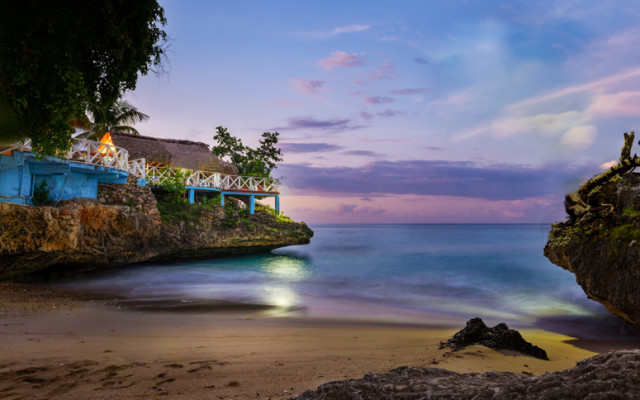
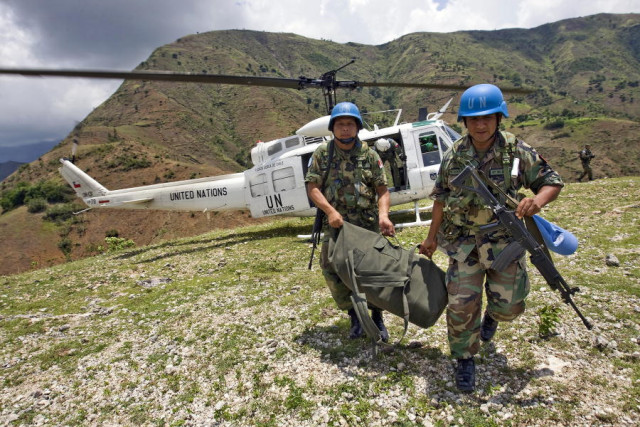
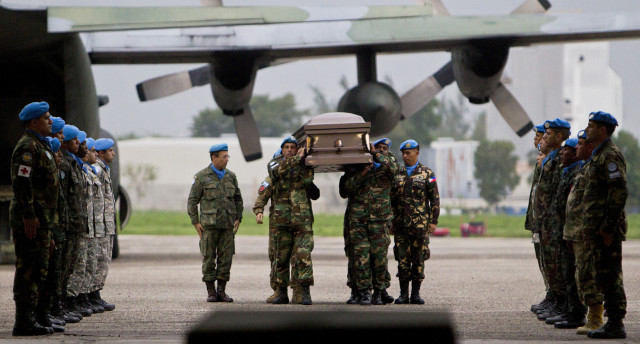
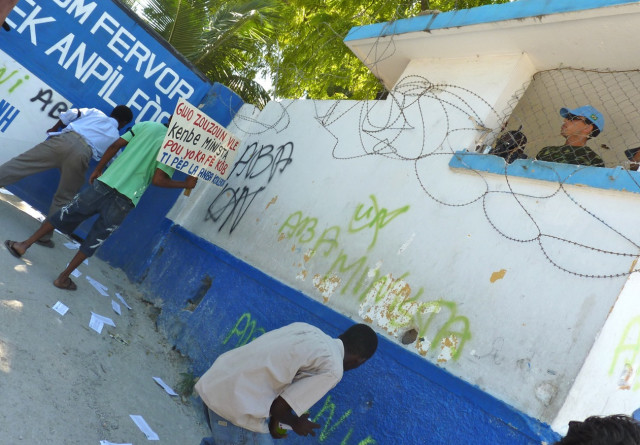
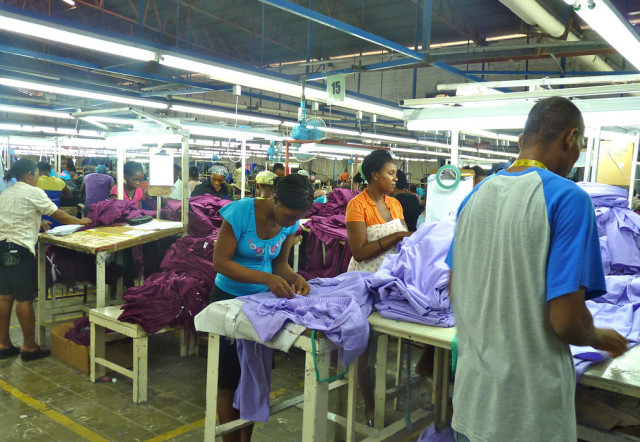
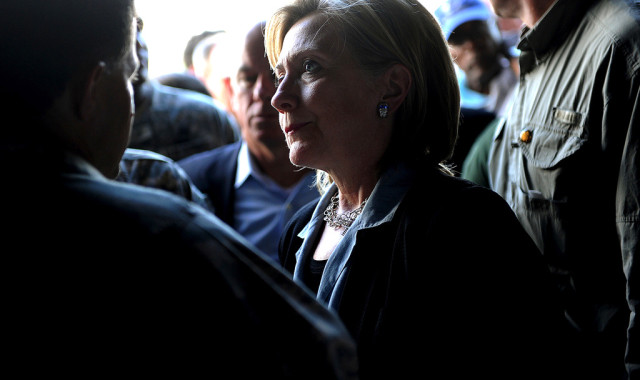
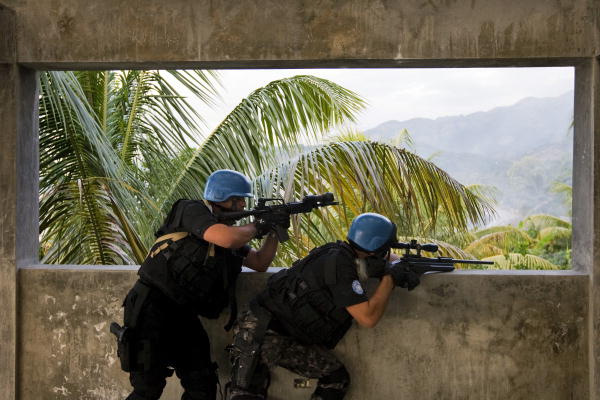
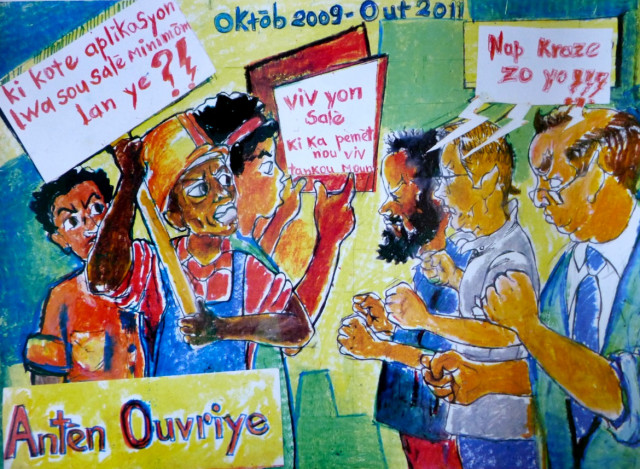
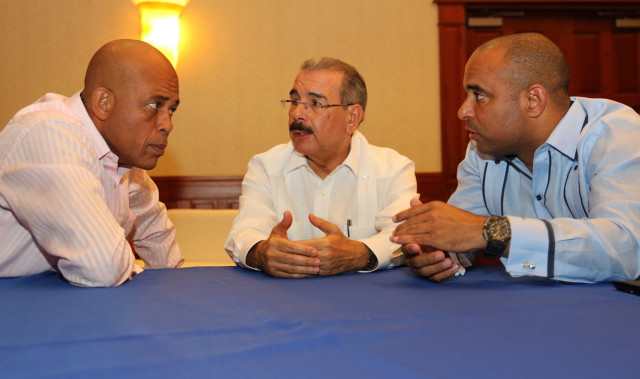
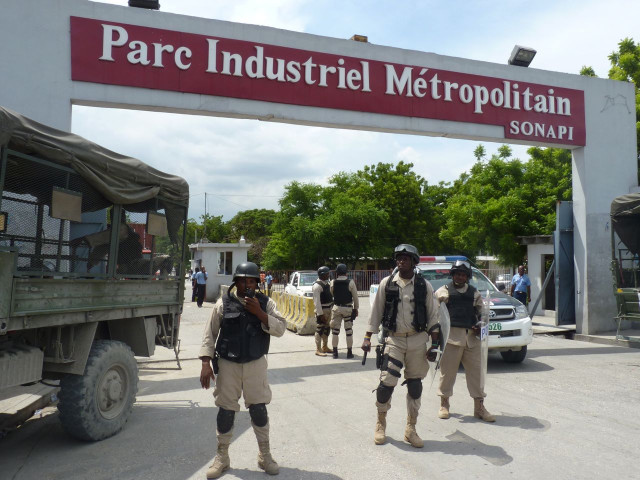
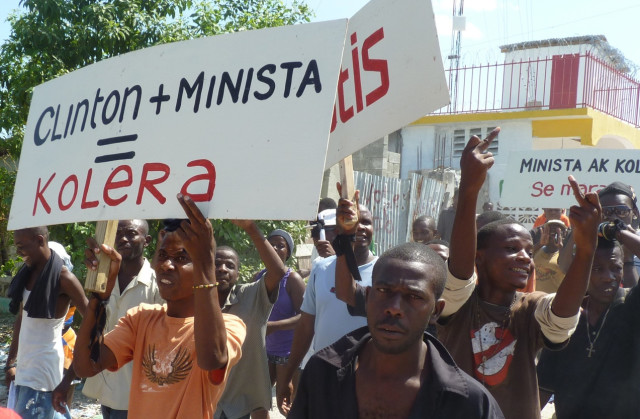
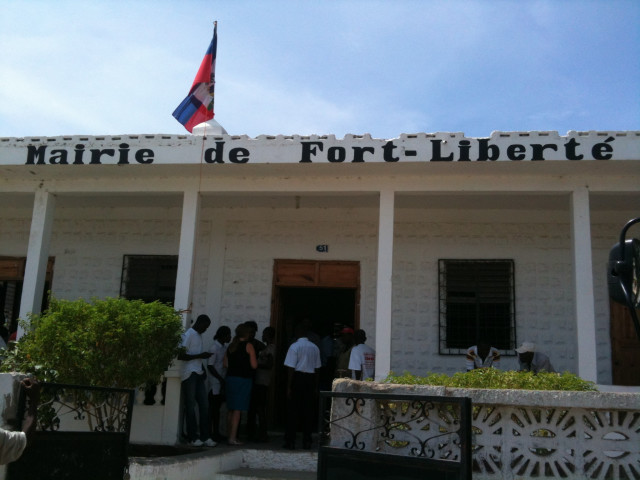
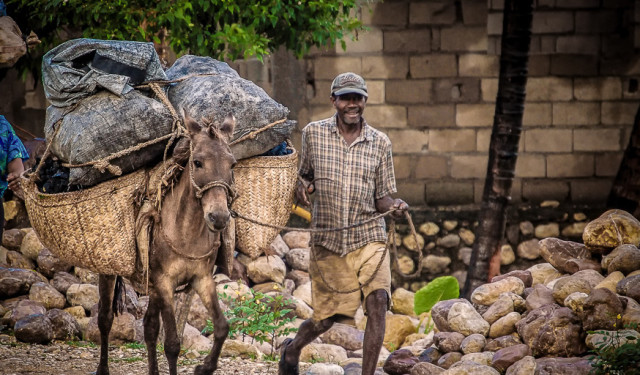
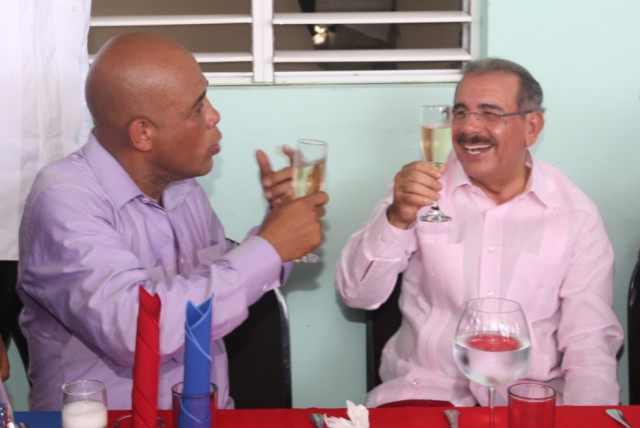
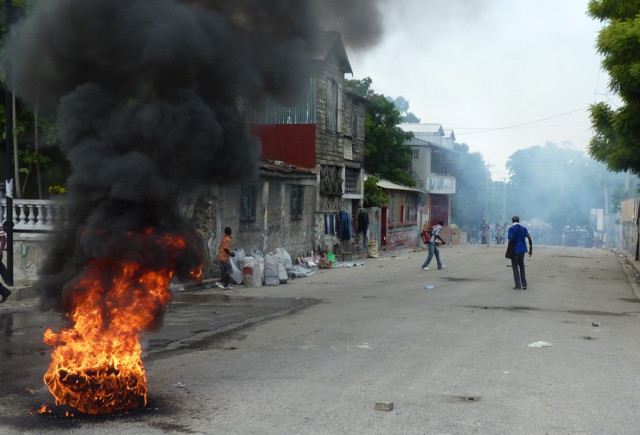











You must be logged in to post a comment Login